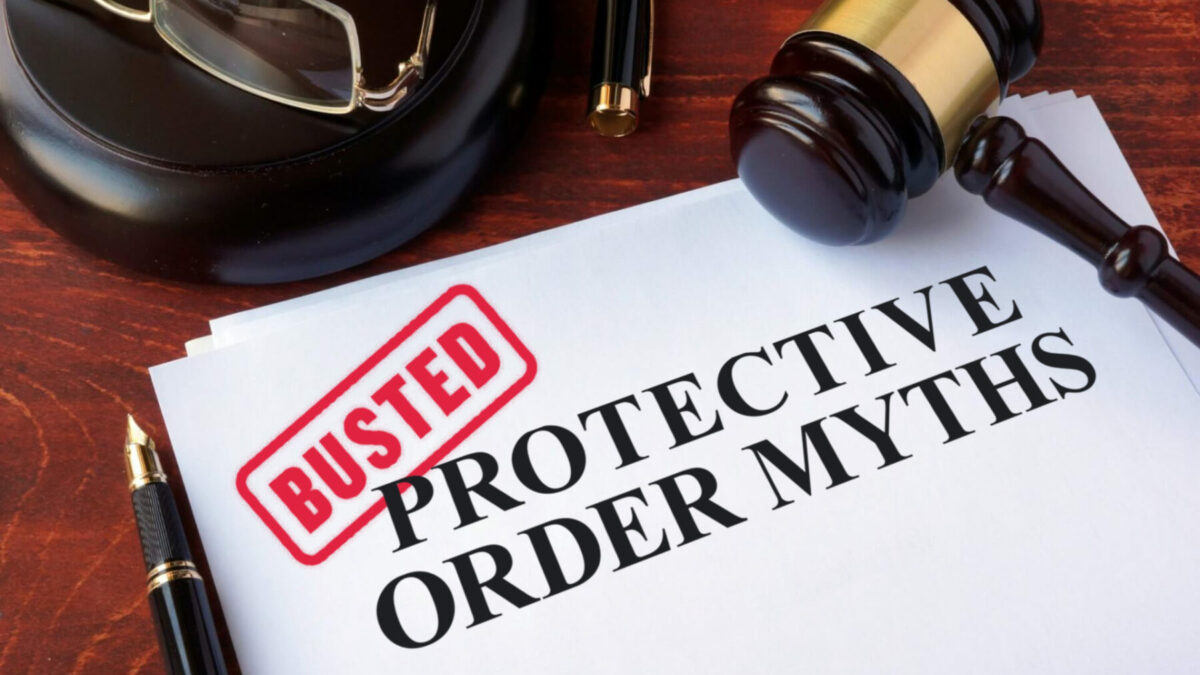Disclaimer: If you or someone you know has been abused, threatened with abuse, or subject to stalking or harassment, it’s important that you first call your local law enforcement. TLC law is a law firm, not a first responder.
Part of our practice area includes filing for protective orders and defending against protective orders. This post is not designed to be a complete overview of the law regarding protective orders. There is no substitute for a consultation with a local Texas attorney about your specific case.
MYTH 1: There are Just Two Ways to Get a Protective Order: Show Abuse or Show Harassment
REALITY: There are four main grounds for civil protective orders, depending on the facts of the case. There are also emergency protective orders, but these follow an arrest for assault or sexual assault and these are not brought by law firms, but by the victim or perhaps law enforcement or prosecutors. In any event, EPOs expire between 31 and 91 days after issuance, so these are not long-term options.
As far as civil protective orders, again there are four main grounds, we’ll call them types, of protective orders:
- The most common type involves evidence that a family member, household member, spouse, boyfriend/girlfriend has physically abused or threatened imminent physical abuse against you or a child
- Another type is when there is evidence of sexual assault against you or your children
- The third type involves evidence of stalking, which can include more than literal stalking and include severe harassment
- The fourth type involves human trafficking.
Each type of protective order requires a different showing; that is, different evidence. Sometimes protective orders can be based on multiple grounds, such as when stalking and abuse are present.
Whether you want to file for a protective order or defend yourself against one, it’s key that you consult with a local attorney in the Smith County, Gregg County, Rusk County, Henderson County area. An attorney can not only represent you in Court, but he/she can advise you regarding the grounds you have for a protective order and the different elements (or proof) you must establish to get a protective order.
Knowing the legal basis for a protective order is also key in defending against one; protective orders can be denied on a technicality.
MYTH 2: It’s Harder than Ever to Get Protective Orders based on Abuse/Threats of Abuse
REALITY: It’s easier than ever. Before September 1, 2023, to get a protective order based on physical abuse or threats of imminent physical abuse, you had to show physical abuse/threats but you also had to show that the abuse or threats were likely to occur in the future. After September 1, 2023, victims will now only need to show the abuse/threats and not that the abuse/threats are likely to occur in the future.
This is a game changer for those wanting a protective order and for those defending against one. Time will tell if this new law stays in effect, but as of this post you should strongly consider consulting an attorney. An attorney could be the difference in a State where protective orders just became much easier to obtain.
MYTH 3: Protective Orders Can’t Address Child Custody Issues or Divorce Issues
REALITY: Wrong, but beware that it’s usually wise to file a divorce/custody suit when filing/defending against a protective order
Obviously protective orders can order the assailant to stay away from the victim, not communicate in any way with the victim, not carry a gun, and so on. But did you know when the protective order is against a baby-momma/daddy or a spouse, the protective order could also address custody issues and divorce-related issues.
For instance, if you and the other party have children together, you could get or be subject to a protective order that gives the assailant supervised or no visitation with the children; the protective order can include child support; and it can include requirements that the assailant do a variety of things including a batterers intervention program, drug testing, and counseling.
If the parties are spouses, the protective order can even include spousal support payments, it can give the victim exclusive use of a home that isn’t even theirs, and it can give the victim exclusive use of a motor vehicle.
Protective orders have a wide-ranging effect. But they do last two years typically. This means that when the protective order expires, so do the orders for child support, spousal support, exclusive use of a residence/vehicle, etc. You should strongly consider filing for a divorce or custody suit (often called a suit affecting the parent-child relationship), so you have an order that lasts beyond the expiration of the protective order.
The interplay between a divorce or custody suit and a protective order can be complicated. You should get an experienced, local attorney that is comfortable dealing with both protective orders and divorce/custody. Sometimes an attorney will only want to do one or the other. But protective orders involving parents or spouses are so interrelated and so complex that you should get an attorney to represent you for both cases.
MYTH 4: Protective Orders Can’t Be Changed Before They Expire
REALITY: Protective orders can be modified, to add or delete conditions. This can be of benefit to either or both parties. For instance, if parties want to be able to exchange their children without having to use third parties like a grandparent, but the protective order doesn’t allow it, it could be wise for both parties to carve out a condition stating how the exchange shall be conducted. It protects the victim and the assailant; the victim knows the assailant will still have to abide by specific conditions during the exchange such as not getting out of the vehicle, and the assailant has the convenience of being able to avoid using a third party and knows he won’t be in violation of the protective order if he follows the new terms.
MYTH 5: Protective Orders are always for Two Years
REALITY: Protective orders can be for less than two years, but are typically for two years. However, a protective order can be for more than two years and can even be lifetime if one of three conditions is met: if the assailant committed felony family violence (such as assault with impeding breath), if the assailant caused serious bodily injury, or if the assailant has two or more prior protective orders protecting the present victim.
MYTH 6: Court for Protective Orders is More Informal; I don’t really Need an Attorney to Bring One or Defend Myself Against One
REALITY: It is a common misconception that protective orders consist of simply going to a courthouse and claiming or denying abuse/harassment/assault and letting the judge decide. Protective Order hearings are bench trials. They involve presenting evidence, calling witnesses to testify, presenting exhibits, making opening and closing arguments, and so on. The rules of evidence and of civil procedure apply. If you are going up against an attorney, expect objections to questions and evidence. Expect a legal fight. Expect that it will not be a fair fight because you don’t know the rules and the procedure.
It is critical that you retain an attorney to present your best case for or against a protective order. It is also important that you hire a local lawyer that knows your judge. Some judges are more prone to grant protective orders, while others are not. Some judges look at certain evidence, and others care little about it. If you don’t have a local attorney that has tried protective order cases in front of the judge you could be at a disadvantage.
MYTH 7: I’ll Have a Lot of Time to Prepare for a Protective Order Hearing; The Judge Must Give me Time to Get an Attorney
REALITY: Protective order hearings are typically required to be set no less than 14 days from the date the application for a protective order is filed. If you are requesting a continuance to get an attorney, you might get one, but you are not necessarily entitled to one. Even if you get a continuance, it is supposed to be reset less than 14 additional days out.
So, bottom line: consult with an attorney as soon as possible if you’ve been served with a protective order. If you are wanting to file for a protective order, it’s also important you get an attorney so you can be prepared with all the witnesses and evidence necessary to prove your case.
Conclusion
Protective order law is changing. It’s now easier to get one than ever when based on violence or threats of violence. But the wide-ranging scope and harsh effect of protective orders remains unchanged. It is critical that you not underestimate the complexity that comes with seeking or defending against a protective order.
Knowledge is power. And so often I see individuals go without an attorney when filing or defending against protective orders. They don’t know the law or the complex nature of protective orders, so they don’t obtain justice. Victims are not properly protected, or fail to seek what they legally can. Alleged assailants have a legal scar that doesn’t go away and that affects their reputation and their job prospects, not to mention their visitation with their children and their pocketbook.
For your voice to be heard, you should start by seeking advice from a local attorney. In a one-hour meeting, an attorney may not be able to ease your mind, but they can tell you what’s at stake and what to expect should you go it alone.
Get Legal Help
If you are ready to consult with a Tyler Lawyer for help with your case, contact TLC Law, PLLC at (903) 871-1714 or request a consultation today.


